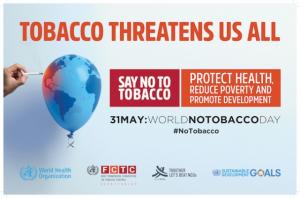Striving for a Tobacco-Free Sierra Leone
May 31 2017 --- On the occasion of World No Tobacco Day, the World Health Organization is highlighting how tobacco threatens the development of nations worldwide, and is calling on governments to implement strong tobacco control measures. Globally tobacco kills more than 7 million people each year, which is one death every five seconds.
According to Sierra Leone’s latest census there are approximately 640,000 tobacco users in the country, including smokers and people who chew or sniff tobacco (‘snuff’). They and those around them, including children, face significant health risks. Evidence shows that up to half of all tobacco users will die prematurely from tobacco-related causes, including heart diseases, stroke, cancer, chronic lung diseases and diabetes and that on average, tobacco use will cost them 15 years of their life.
Other common health effects from tobacco consumption include infertility; erectile dysfunction; breathing difficulties; infections, and high blood pressure. Meanwhile the economic costs of tobacco use are also substantive, with governments losing over US$1.4 trillion worldwide through healthcare expenditure and lost productivity.
“Tobacco threatens us all,” says WHO Director-General Dr Margaret Chan. “Tobacco exacerbates poverty, reduces economic productivity, contributes to poor household food choices, and pollutes indoor air.”
Dr Chan adds: “But by taking robust tobacco control measures, governments can safeguard their countries’ futures by protecting tobacco users and non-users from these deadly products, generating revenues to fund health and other social services, and saving their environments from the ravages of tobacco.”
Tobacco control has been enshrined in the Sustainable Development Agenda (the UN Global Goals) and is seen as one of the most effective means to achieve, by 2030, a one-third reduction in premature deaths from noncommunicable diseases like cancer and heart disease.
“It is not only governments who can help end the scourge of tobacco: people and communities can also contribute to creating a tobacco-free Sierra Leone, and commit to never take up or stop using tobacco products,” says Dr. Alie Wurie, Director of Noncommunicable Diseases at Sierra Leone’s Ministry of Health and Sanitation.
“Even for those who don’t smoke, tobacco can harm you and your children,” he adds. “Worldwide there are around 890,000 deaths from secondhand smoke every year, as well as significant impacts on health. We all have a role to play in discouraging tobacco use and protecting the public from these tragic effects.”
Sierra Leone is a party to the WHO Framework Convention on Tobacco (FCTC), which aims to help countries tackle tobacco’s negative impact on development. In particular, increasing tobacco taxes and prices; promoting tobacco cessation; bans on advertising of tobacco products, and restrictions on smoking in public places are proven and effective ways to protect public health.
Currently, the Government of Sierra Leone is taking important steps to advance tobacco control, says Dr. Wurie, including the introduction of critical new taxation on harmful tobacco products; the advancement of draft legislation relating to the consumption, marketing and sale of tobacco; and participation in new WHO FCTC programmes.
Facts about tobacco control
• Tobacco use is a threat to any person, regardless of gender, age, race, cultural or educational background. It brings suffering, disease, and death, impoverishing families and national economies.
• Tobacco use costs national economies enormously through increased health-care costs and decreased productivity. It worsens health inequalities and exacerbates poverty, as the poorest people spend less on essentials such as food, education and health care. Some 80% of premature deaths from tobacco occur in low- or middle-income countries, which face increased challenges to achieving their development goals.
• The WHO Framework Convention on Tobacco (WHO FCTC) is the world’s most powerful tool to tackle tobacco’s negative impact on development. The WHO FCTC entered into force in 2005, and its Parties are obliged to take a number of steps to reduce demand and supply for tobacco products. Actions addressed in the Convention include protecting people from exposure to tobacco smoke, banning tobacco advertising, promotion and sponsorship, banning sales to minors, requiring health warnings on tobacco packaging, promoting tobacco cessation, increasing tobacco taxes and creating a national coordinating mechanism for tobacco control. There are 180 Parties to the Convention.
• As well as legislation on tobacco consumption, marketing and sales, taxation policy is also important. Through increasing cigarette taxes worldwide by US$1, an extra US$190 billion could be raised for development. High tobacco taxes contribute to revenue generation for governments, reduce demand for tobacco, and offer an important revenue stream to finance development activities.
A new WHO report, Tobacco and its environmental impact: an overview, also shows the impact of this product on nature, including:
- Tobacco waste contains over 7000 toxic chemicals that poison the environment, including human carcinogens.
- Tobacco smoke emissions contribute thousands of tons of human carcinogens, toxicants and greenhouse gases to the environment. And tobacco waste is the largest type of litter by count globally.
- Up to 10 billion of the 15 billion cigarettes sold daily are disposed in the environment.
- Cigarette butts account for 30-40% of all items collected in coastal and urban clean-ups.
Contacts :
At WHO : Laura Keenan, keenanl [at] who.int, +232 786 33 952
AT MoHS : Solomon Rogers, solomonrogers [at] yahoo.com



